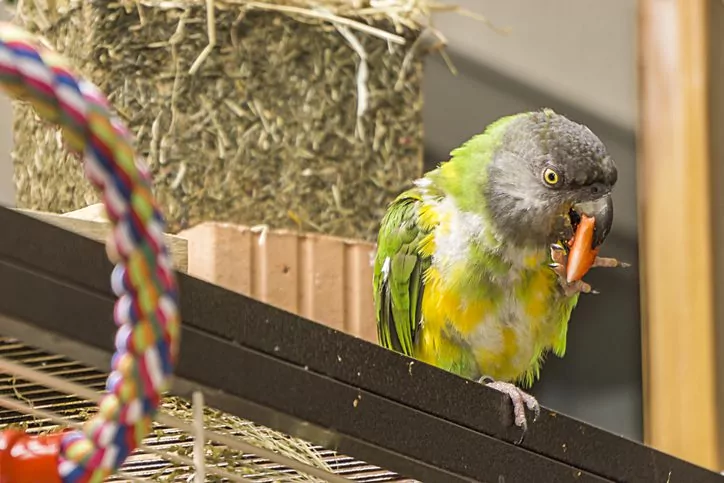Do you have a parrot, or are you thinking of adopting one? There are many considerations to keep in mind when you’re planning to bring a parrot into your household, and there is a lot of research you need to perform as well. However, one of the many factors to think about is what you will feed your bird.

In our animal hospital‘s article below, we’ll provide a quick guide to help you understand your parrot’s nutritional needs. With the help of this information, you can pick a healthy food blend for your new feathery friend or upgrade the diet of your existing parrot instead. Read on to find out more!
Pellet Food
A parrot’s diet needs to consist of at least 50% pellet-type food, although even more pellet food in your bird’s diet can be beneficial as well. There are many brands and styles of pellet foods on the market, and each one has its own strengths and weaknesses. It’s up to you to choose a well-balanced option that your bird is interested in eating.
Pellet food may not necessarily always be in the shape of pellets, either. If your bird prefers food crumbles or other shapes, you can find them at most pet food stores as well.
Vegetables
After pellet food, the next most significant part of your bird’s diet should be comprised of vegetables. Vegetables should be at least 25% of your parrot’s daily meal intake, but more is always better. There are some types of vegetables that are better for birds than others.
For example, leafy greens are almost always ideal for birds, and most parrots enjoy eating whole carrots, including the greens as well as the root. If your parrot doesn’t seem interested in eating raw vegetables, try boiling them (with no added salt or other seasonings) to see if your bird responds to them better.
Fruit
Fruit is very sweet and should only be fed in moderation. However, you can give your bird enough fruit to comprise about 5% of your pet’s daily nutritional intake. Do not let your bird eat the pits or seeds of fruits, though, as many of these are highly toxic.
Some of the best fruits for birds include mangoes, pineapples, grapefruits, and star fruits, among many others. There are very few fruits that a pet parrot should avoid entirely, but avocado is one you should never feed to your bird.
Grains and Beans
You do not have to supplement your bird’s diet with grains or beans, but many people do provide these foods to parrots in moderation. These foods should typically only be given once or twice a week, but they can be a fun addition to keep mealtime interesting for your parrot.
Cooked pasta, brown rice, oats, and barley are all good choices for parrots. Additionally, cooked beans and peas can be a good treat for some birds. Test your bird’s palate and see which ones of these foods may be the most interesting, and then use it as a bonus treat for special occasions.
Seeds
Although many parrots and other birds love to eat seeds, it is best to avoid giving them to your pet at all. Seeds can quickly become a junk food to parrots, and they may not be interested in eating anything else. Unfortunately, there is very little nutritional value in seeds, so an all-seed diet can be very detrimental to a parrot’s health.
The only exception to this rule is sprouted seeds, which are seeds that have just recently sprouted for the first time. These seeds are packed with nutrients, as long as your bird eats the sprouts as well as the seed portion and can be a good treat.
Reach Out to Our Avian Vets If You Have More Questions About the Best Food for Your Parrot
Choosing the right food for your parrot can be tricky, especially if your bird has any underlying health needs or concerns to keep in mind. However, there are plenty of parrot hobbyist groups and organizations that can provide great recommendations for specific brands to help you get started.
Additionally, it’s important to find a good quality exotic animal vet to help you take care of your parrot. Aside from just helping you choose a good food blend, your parrot’s vet can help you stay up to date on your pet’s health and wellness needs, too.
If you have any additional questions regarding your parrot’s bird food, let our exotic animal hospital know during your parrot’s next vet visit with us. To schedule your parrot’s exam, give us a call at (301) 994-9919.
